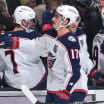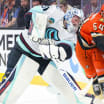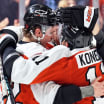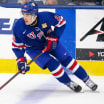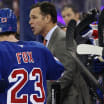Hughes, Heiskanen, Makar impress Hall of Famers with playoff performances
Stevens, Lidstrom, Leetch, Coffey praise crop of young NHL defensemen
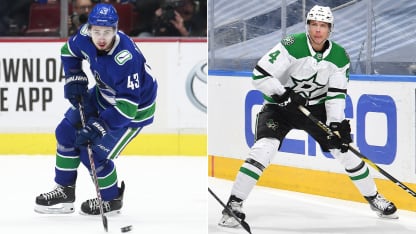
Some Hall of Fame defensemen have taken notice.
"We probably haven't seen a young group of defensemen like this in a long time," Scott Stevens said. "There's no question these are pretty special moments for young defensemen in the National Hockey League."
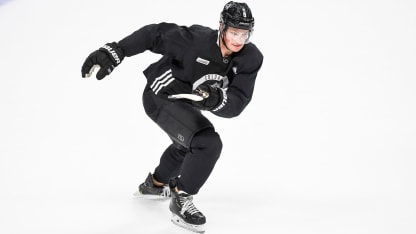
Makar of the Colorado Avalanche, Hughes of the Vancouver Canucks, and Heiskanen of the Dallas Stars aren't the only young defensemen still in the playoffs who are getting noticed. Samuel Girard of the Avalanche, Charlie McAvoy of the Boston Bruins, Mikhail Sergachev of the Tampa Bay Lightning and Ivan Provorov of the Philadelphia Flyers are also drawing compliments.
Stevens, a 2007 Hockey Hall of Fame inductee who played 22 seasons in the NHL with the Washington Capitals, St. Louis Blues and New Jersey Devils, is not alone in his praise for the group. Fellow Hall of Fame defensemen Nicklas Lidstrom, Paul Coffey and Brian Leetch are equally impressed and joined Stevens in a roundtable discussion with NHL.com to analyze the new generation of young defensemen.
"The thing that grabs your attention the most is how young they are," said Lidstrom, who played all 20 of his NHL seasons with the Detroit Red Wings and was inducted into the Hall of Fame in 2015. "Most of them are in their early 20s if that. They're playing really mature for their age on both sides of the puck, offensively and defensively."
Leetch, who played 18 NHL seasons with the New York Rangers, Toronto Maple Leafs and Boston Bruins, was inducted into the Hall of Fame in 2009. Coffey, who was inducted five years earlier, played for nine teams during his 21-year career and holds the NHL single-season record for goals by a defenseman (48), set with the Edmonton Oilers in 1985-86.
All four panelists were named to the 100 Greatest NHL Players during the League's Centennial season in 2017, and each said he's encouraged about the future of the game because of the way some of the League's young defensemen are performing.
The common thread between Heiskanen, 21, Makar, 21 and Hughes, 20 is that all are smooth-skating players who quarterback the power play for their respective teams.
Heiskanen leads all defensemen in postseason points with 15 (three goals, 12 assists). Hughes and Makar are in a three-way tie for second with Shea Theodore of the Vegas Golden Knights with 11 points; Hughes has one goal and 10 assists, and Makar, known for his dynamic end-to-end rushes, has two goals and nine assists. Girard, 22, one of the better puck-handling defensemen in the League, has six points (one goal, five assists).
McAvoy, 22, has four points (one goal, three assists) and is known for his timely body checks, So too, is Sergachev, 22, who has four points (one goal, three assists) and scored for the first time in this postseason against the Bruins on Wednesday in Game 3 of the Eastern Conference Second Round.
Provorov, who at 23 might be the best two-way player of the group, also has four points (one goal, three assists). All seven are averaging more than 20 minutes of ice time per game for their respective teams.
Here is what the Hall of Famers had to say about the seven:
First off, this panel consists of some of most decorated defensemen in hockey history, combining for 12 Stanley Cup rings, winning the Norris Trophy as the NHL's top defensemen 12 times and the Conn Smythe trophies as MVP of the Stanley Cup Playoffs three times. Given all that, what is there about this generation of young defensemen that jumps out at you so much.
Leetch: "When I see some of these guys like Makar and Heiskanen and Hughes and even Adam Fox in New York (Rangers), well, when you're watching the game live when you're up top (in the press box) or on TV, it's easier for you to see the plays that are open. So you're always anticipating ahead. When the player actually makes that play at the time you're seeing it on TV or seeing it from up above, it's just fun as player who's retired and can't do it anymore to see it. And these young guys are doing it so early. That's the amazing part. I know I couldn't do it at some of their ages. That first year I was not developed to make the type of impact these guys are."
Lidstrom: "What sticks out when you watch them is the way they can skate. When they carry the puck up the ice, make plays, their skating is so smooth, so good. I think one common denominator they have is that they're all great skaters. And they're so young."
Stevens: "It's amazing. Makar and Hughes just stepped in like they've played in the NHL for years. Heiskanen is another guy. You don't see that. Usually it takes time for guys to settle in at the position in the NHL. Usually for guys like that, it takes time during their development to see what kind of defensemen they are, what their skill set is and how it will be best utilized. These guys stepped right in, they create. They're fun to watch."
Why do you think they're able to have such success at an early age?
Leetch:"All I can point to is the training that these guys do at a younger age. Another factor: the new rules (obstruction crackdown, change allowing two-line passes) that were implemented during that first shutdown season (2005-06) so that guys who skate well and see the game are not limited as much earlier (in their careers). Even if they're not physically developed yet, their skating and the way they see the game allows them to have big impacts, whereas in the past you had to wait a year or two until you got on a regular NHL training schedule and you developed your body and you learned about the League and what you could do. I see this as a big plus for all these defensemen. They can all see the game. They can all skate. They can play. And they have a little more room out there to do it."
Lidstrom: "The thing I notice about those kids, aside from their talent, is how they're not afraid to make mistakes. And they're so mature at the same time. They don't play or act like teenagers. They're ahead of their time and they're so enjoyable to watch. There is no second-guessing with them. They make a decision and follow it through."
Coffey: "The thing I love about guys like Hughes, Makar and Heiskanen is that they're not afraid to make plays. There are too many guys that just go on the ice, then get off it. I watch the game as a fan now and I see it; they go on the ice, they go off the ice and they think they've done their job because they've ripped it off the glass while forwards are up there waiting for a pass while they're wide-open. But you see the success that Colorado and Dallas and Vancouver have had to get to this point. You need guys on the back end who can move the puck."
How much of that is having the right coach?
Coffey: A guy like (Vancouver's) Travis Green; great guy, great coach because he allows his players to play. I'm pretty sure Quinn Hughes is just allowed to go out there and play hockey. Sure he has to be aware of a couple of things. Like when you're 5 years old, last man back. And Makar, the same thing. Their coach (Jared Bednar) lets the kid play. It's entertaining. It goes part and parcel. Everyone wants 'that' defensemen. Some guys get one and they don't know how to coach him. They don't know how to stay out of the way sometimes."
Having said all that, which player(s) stands out for you?
Stevens: "There are so many. Makar has been outstanding to what he brings to the team. Hughes is just an intelligent hockey player. He's taken huge steps in the playoffs. Heiskanen too. And there are others in the group -- McAvoy, Sergachev, Provorov, Girard. They're great all-around defensemen, and I really appreciate those types of defensemen. That's how I wanted to play, and as a coach you can appreciate guys you can put out in any situation whether you're up by a goal, down by a goal. A lot of defensemen are just one-dimensional. The all-around defensemen are the guys who stand out in playoff hockey, and those are the guys you can rely and lean on at crunch time."
Coffey:"I know Hughes quite well; I coached his younger brother Luke for a few years in minor hockey in Toronto (Toronto Marlies). Quinn was the type of kid you didn't have to tell anything. You just let him go and let him do his thing … The one thing about Hughes, he doesn't have a bullet for a shot, but the thing gets through every single time. That's a huge plus for him. Makar is similar to Quinn in that when he has that inkling to go, he goes. No hesitation. I love that."
Lidstrom:"Heiskanen doesn't look like he's pushing that hard, but he's moving fast. That's what sticks out with him."
Leetch: "Of all the young kids, (Heiskanen) probably reminds me the most of how I saw the game. Maybe not the fastest person on the ice, but you understood how to get a step and separate and (were) always weighing the options and making the passes. Not the hardest shot, but shooting for an area, shooting for a screen. Everything he does is the way I always pictured myself looking at the game. It's been fun to watch him. Smooth out there. I wouldn't say effortless like the way Nick Lidstrom made it look out there. But the way he moves, the way he reads things out there, I enjoy everything about his game."
Coffey:"McAvoy's not a bad player either. So I'm sure (Zdeno) Chara is mentoring him. And if the kid's smart, which I'm sure he is, he'll watch him every day, watch what time he gets to the rink, what he does in the workout room, all of it."








